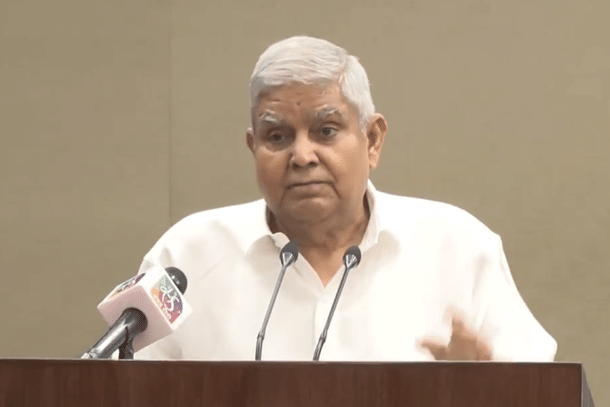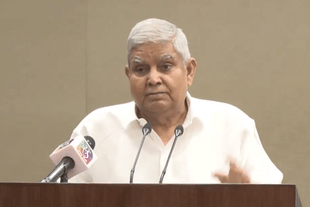News Brief
'Article 142 Has Become A Nuclear Missile Against Democractic Forces': Vice President Dhankhar's Sharp Critique Of Judiciary
Kuldeep Negi
Apr 17, 2025, 04:16 PM | Updated 04:16 PM IST
Save & read from anywhere!
Bookmark stories for easy access on any device or the Swarajya app.


In a sharp response to a recent Supreme Court ruling that effectively set a deadline for clearance of Bills by the President and Governors, Vice-President Jagdeep Dhankhar has criticised judicial overreach, stating that we cannot have a situation where courts direct the President, NDTV reported.
Further, Dhankhar said that the Article 14 of the Constitution, which gives special powers to the Supreme Court, has become a "nuclear missile against democratic forces, available to the judiciary 24x7".
Addressing the sixth batch of Rajya Sabha interns, Dhankhar raised alarm over the massive cash haul from the residence of Justice Yashwant Varma in March.
He questioned the week-long silence that followed and asked whether such a delay in disclosure was “explainable or condonable”, noting that public shock only surfaced after a media report on 21 March.
"An event happened on the night of the 14th and 15th of March in New Delhi, at the residence of a judge. For seven days, no one knew about it. We have to ask questions to ourselves: Is the delay explainable? Condonable? Does it not raise certain fundamental questions? In any ordinary situation—and ordinary situations define rule of law—things would have been different. It was only on 21st March, disclosed by a newspaper, that people of the country were shocked as never before. They were in some kind of limbo, deeply concerned and worried at this explosive, alarming expose," he said.
"Thereafter, fortunately, in public domain, we had input from an authoritative source: the Supreme Court of India. And the input indicated culpability. Input did not lead to doubt that something was amiss. Something required to be investigated. Now the nation waits with bated breath. The nation is restive because one of our institutions, to which people have looked up always with highest respect and deference, was put in the dock," he added.
The Vice-President said no FIR has been filed against the judge after the cash haul.
"An FIR in this country can be registered against anyone—any constitutional functionary, including the one before you. One has only to activate the rule of law. No permission is required. But if it is judges—FIR cannot be straightaway registered. It has to be approved by the concerned in judiciary. But that is not given in the Constitution," he said.
"The Constitution of India has accorded immunity from prosecution only to the Hon'ble President and the Hon'ble Governors. So how come a category beyond law has secured this immunity? Because the ill-effects of this are being felt in the mind of one and all. Every Indian, young and old, is deeply concerned. If the event had taken place at his house, the speed would have been an electronic rocket. Now, it is not even a cattle cart," Dhankhar added.
He also challenged the formation of a three-judge panel to probe the case.
"There is a committee of three judges investigating the matter, but investigation is domain of the Executive. Investigation is not the domain of Judiciary. Is the committee under the Constitution of India? No. Is this committee of three judges having any sanction under any law emanating from Parliament ? No. A committee can at most make a recommendation," he said.
"The kind of mechanism we have for judges, the only action that can be taken is by the Parliament. A month has passed. An investigation requires speed, expedition and preservation of incriminating material. As a citizen of the country and holding position which I do, I am concerned. Are we not diluting rule of law? Are we not answerable to 'We the People' who gave us the Constitution?," he asked.
He said over a month has passed since the cash haul.
"It is now over a month. Even if it is a can of worms. Even if there are skeletons in the cupboard, time to blow up the can. Time for its lid to go out. And time for the cupboard to collapse. Let the worms and skeletons be in the public domain so that cleansing takes place," he said.
His remarks come in the wake of the Supreme Court’s order in Tamil Nadu case, in which it ruled that Governor RN Ravi's decision to withhold assent to 10 Bills was "illegal" and "arbitrary".
The bench of Justice JB Pardiwala and Justice R Mahadevan effectively set a three-month deadline for Presidential and gubernatorial assent to Bills passed by the legislature for the second time.
The Court also said that the President's functions are amenable to judicial review under Article 201 of the Constitution.
The Supreme Court also said in the judgment that only courts have the prerogative to provide recommendations regarding the constitutionality of a Bill and the Executive is supposed to exercise restraint in such matters.
The Apex Court underlined that it would be prudent for the President to refer Bills with constitutional questions to the Supreme Court
Dhankhar said the President of India is a very elevated position and takes the oath to preserve, protect and defend the Constitution.
"There is a directive to the President by a recent judgment. Where are we heading? What is happening in the country? We have to be extremely sensitive. It is not a question of someone filing a review or not. We never bargained for democracy for this day. President being called upon to decide in a time-bound manner, and if not, becomes law. So we have judges who will legislate, who will perform executive functions, who will act as super-parliament, and absolutely have no accountability because law of the land does not apply to them," he said.
"We cannot have a situation where you direct the President of India and on what basis? The only right you have under the Constitution is to interpret the Constitution under Article 145(3). There, it has to be five judges or more... Article 142, Article 142 has become a nuclear missile against Democratic forces, available to judiciary 24 x 7", he said about the provision granting special powers to Supreme Court.
Article 142 of the Constitution of India gives the Supreme Court the power to make orders that ensure "complete justice" in any matter before it.
Also Read: TBM Breakthrough On Line 7A Marks Completion Of MMRDA’s First Underground Metro Tunnel In Mumbai
Kuldeep is Senior Editor (Newsroom) at Swarajya. He tweets at @kaydnegi.





